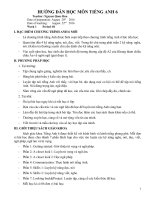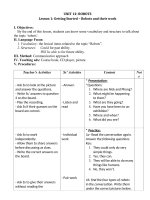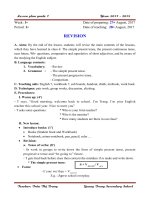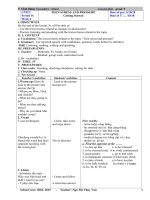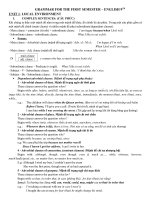- Trang chủ >>
- Sư phạm >>
- Sư phạm mầm non
Tieng Anh 8 Sach moi Giao an hoc ki 1
Bạn đang xem bản rút gọn của tài liệu. Xem và tải ngay bản đầy đủ của tài liệu tại đây (227.84 KB, 53 trang )
AN TIEN SECONDARY SCHOOL- ENGLISH 8 LESSON PLAN
Week:
/ /
Period: 69
/ /
Date of planning:
Date of teaching:
UNIT 9: NATURAL DISASTER
LESSON 1: GETTING STARTED-SHOCKING NEWS
I. Objectives:
1. Knowledge: By the end of the lesson, students will be able
to:
- listen for specific information about a day trip to an
amazing town
- write a description of a schedule for a visit or a tour
2. Skills: Listening, writing
3. Attitude: Ss must have good attitude towards facing natural
disaster
4. Competencies: Describing natural disasters
II. Main languages:
1.Vocabulary: lexical items related to the topic “Natural
disasters”
2.Grammar: Review: use the past perfect tense to talk about an
action before a stated time or another action in the past
- Passive voice: review
III. Teaching aid: lesson plan, visual pictures
IV. Procedures
Teacher’s
Ss’
Contents
activities
activities
Warm – up.( 5’) Team work Warm – up.( 5’):
- T helps Ss
Game
review the
previous unit by
asking them to
take part in a
quick game. - T
divides the class
into two teams.
Using a soft ball
or rolled up ball of
paper, have a
student in Team A
throw the ball to
the other team,
Teacher: Hoang Mai Anh- School year: 2017- 2018
Competen
ces
Reviewing
40
AN TIEN SECONDARY SCHOOL- ENGLISH 8 LESSON PLAN
calling out an
English speaking
country, e.g.,
England. Whoever
catches the ball
must think of a
thing or a place
that country is
famous for e.g.,
Big Ben, London,
Liverpool,
afternoon tea.
The Beatles, etc.
Continue with
other countries
until the time is
up.
Presentation
(10’)
Pre-teach
vocab:
Set the scene:
1. Ask Ss to look
at the title of the
conversation and
the picture. Ask
them some
questions:
Write the unit title
on the board
‘Natural
Disasters’.
Whole
class
*Vocabulary:
Vocabularies
related to
“Natural disasters”
- volcano (n)
- tornado (n)
- flood (n)
- forest fire (n)
- earthquake (n)
- tsunami (n)
- mudslide (n)
Work
- drought (n)
individually - debris (n)
- trap (v)
Ss work
independe
ntly. Then
share
answers
before
discussing
as a class.
Key:
1. tropical storm
2. Injured
3.damage
4. trapped
5. medical supplies
6.temporary
accommodation
Teacher: Hoang Mai Anh- School year: 2017- 2018
Taking note
of vocab
Reading
and
listening
41
AN TIEN SECONDARY SCHOOL- ENGLISH 8 LESSON PLAN
Elicit any
information Ss
know about
natural disasters
by asking about
natural disasters
that have
happened where
they love or
anywhere else in
the world that
they know of.
What was
the natural
disaster?
When did it
happen?
Was there
any damage to
people or
property?
Practice (20’)
1a. Read the
conversation
again and fill in
the gaps with
no more than
three words.
Ask Ss to read
each sentence
and locate the
information in the
conversation,
then choose
suitable words/
phrases to fill
each blank.
b. Responding
to news
T model an
exchange with a
student by giving
In pairs, Ss
practice
saying the
phrases
with
correct
intonation.
Ss work
independe
ntly.
Ss work
independe
ntly. Then
share
answers
before T
gives
comments.
Responding to
good news- bad
news
Wow!
Oh
dear!
That’s great!
That’s
awful!
That’s a relief!
How
terrible!
How wonderful!
Oh no!
That’s
shocking!
Key:
1. b
2. d
3. f
4. c
5. a
6.e
Key:
1. C
4. B
Speaking
2. D
3. F
5. G
Teacher: Hoang Mai Anh- School year: 2017- 2018
42
AN TIEN SECONDARY SCHOOL- ENGLISH 8 LESSON PLAN
some bad news,
‘My cat died.’ and
eliciting ‘That’s
terrible!’ from the
student. Focus on
intonation,
stressing the first
syllable of
‘terrible’. Do the
same with other
Ss around the
class. Encourage
Ss to have fun
exaggerating
their intonation as
they reply to T.
Tell Ss to refer
back to the
conversation to
find the other
phrases. (Play the
recording a
model if
necessary)
2a Write the
responses into
the corrects
columns. Then
listen, check
and repeat.
First, have Ss
work
independently.
Then allow them
to share answers
before playing the
recording for
them ti check.
Play the recording
for Ss to repeat
the phrases.
Remind Ss to play
7. H
6.A
8. E
Ss work in
pairs to
match the
words/
phrases to
the
pictures.
Work in
pairs
Teacher: Hoang Mai Anh- School year: 2017- 2018
Practicing
43
AN TIEN SECONDARY SCHOOL- ENGLISH 8 LESSON PLAN
attention to their
intonation as they
practice.
b. Match the
sentences (1-6)
to the
responses (a-f).
Then practice
the exchanges
with a partner.
First, have Ss
work
independently.
Then allow them
to share answers
before T gives
comments. Point
out that some of
the responses
could fit more
than one
statement. If Ss
can justify their
choice, then
accept it. Ask Ss
to work in pairs,
practicing the
exchanges with
good intonation. T
goes around the
class to provide
help.
3. Match the
natural
disasters with
the pictures.
Then listen,
check your
answers and
repeat. Can you
Teacher: Hoang Mai Anh- School year: 2017- 2018
44
AN TIEN SECONDARY SCHOOL- ENGLISH 8 LESSON PLAN
add more?
First, have Ss
work in pairs to
match the words/
phrases to the
pictures. Then
allow them to
share answers
with another pair
before playing the
recording for
them to check.
Play the recording
for Ss to repeat
the words/
phrases.
Further practice
(7’)
4. Work in
pairs. Ask and
answer
questions about
common
natural
disasters in
some areas in
Viet Nam.
Ask Ss which of
these natural
disasters can
happen in Viet
Nam. Then model
this activity with
a more able
student. Next ask
Ss to work in
pairs. Go around
to provide help.
Call on some
pairs to practice
in front of the
class.
Teacher: Hoang Mai Anh- School year: 2017- 2018
45
AN TIEN SECONDARY SCHOOL- ENGLISH 8 LESSON PLAN
Homework(3’):
Prepare for unit 9
lesson 2
Week:
/ /
Period: 70
/ /
Date of planning:
Date of teaching:
UNIT 9: NATURAL DISASTER
LESSON 2: A CLOSER LOOK 1
I. Objectives:
1. Knowledge: By the end of the lesson, students will be able
to:
- Practice the vocabulary and pronunciation of the
unit 9.
2. Skills: Listening, speaking
3. Attitude: Ss must have good attitude towards facing natural
disaster
4. Competencies: Coping with disasters
II. Main languages:
1.Vocabulary: erupt (v), strike (v), rage (n/v), collapse (v),
shake (v), scatter (v),
evacuate (v), put out (v)
2.Grammar:
3. Pronunciation: - Stress in words ending in –logy and –
graphy.
III. Teaching aid: lesson plan, visual pictures
IV. Procedures
Teacher’s
Ss’
Contents
Competen
activities
activities
ces
Warm – up.( 5’)
Whole class Warm – up.( 5’): Speaking
Ask sts to tell
Review
about some
natural disasters
Whole class
they’ve
experienced.
Pre-listening
*Vocabulary:
(10’)
erupt(v)
Pre-teach
strike(v)
vocab:
rage(n/v)
collapse(v)
Teacher: Hoang Mai Anh- School year: 2017- 2018
46
AN TIEN SECONDARY SCHOOL- ENGLISH 8 LESSON PLAN
While-listening
(20’)
1. Fill in each
blank with a
suitable verb in
the correct from
the box below.
Then listen,
check and
repeat.
Write the first
verb erupt on the
board and elicits
the past tense
from Ss, writing
erupted on the
board. Do the
same with all the
verbs. T may ask
for a translation of
the verbs to check
their
understanding.
Leaving them on
the board as a
reference. Play
the recording for
Ss to repeat the
sentences. With a
stronger class, T
may wish to ask
Ss to make some
more examples
shake(v)
scatter(v)
evacuate(v)
put out (v)
bury (v)
Ss work
rush into(v)
independen debris (n)
tly to do the shelter (n)
activity.
Key:
Then share
1. struck
2.
their
erupted 3.
answers
shook
4.
with one or buried 5. raged
more
6.
partners.
Collapsed
Teacher: Hoang Mai Anh- School year: 2017- 2018
Listening
47
AN TIEN SECONDARY SCHOOL- ENGLISH 8 LESSON PLAN
with the verbs in
the box. Finish all
the exercises
Audio script:
1. Yesterday, a
terrible storm
struck the rural
area of Ha Giang
Province.
2. Villagers rushed
into public
shelters as soon
as the volcano
erupted.
3. Hundreds of
buildings were
completely
destroyed when
the earthquake
shook the city.
4. The mudslide
buried the whole
village while
people were still
sleeping in their
houses.
5. The forest fire
raged for eight
hours and some
animals were
badly injured or
killed.
6. We managed to
run out of the
house into the
street before the
walls collapsed.
2. Match the
verbs in column
A to the nouns
in column B.
Then listen,
Key: 1. b
d
3. a
e
5. C
2.
4.
First, Ss
work
independen
tly. Then,
share their
answers
with one or
more
partners.
Practicing
Key:
1. Provide aid 2.
Put out the forest
fire 3. Took shelter
4. Scattered
debris 5. Evacuate
the village.
Ss
complete
the
sentences
individually,
using the
phrases in
2.
Pronunciatin
g
Words
ending in
-logy and
-graphy
REMEMBER
For the
Key:
1.
soci’ology 4.
clima’tology
2.
zo’ology 5.
as’trology
3.
Teacher: Hoang Mai Anh- School year: 2017- 2018
48
AN TIEN SECONDARY SCHOOL- ENGLISH 8 LESSON PLAN
check and
repeat.
T may ask for
translation of
some phrases to
check their
understanding.
Play the recording
for Ss to repeat
the phrases.
Audio script: 1.
scatter debris
2. take shelter 3.
evacuate the
village
4. provide aid 5.
Put out the forest
fire
3. Now use the
phrases in 2 in
the correct from
to complete the
sentences.
Have some Ss
read out their
answers before
checking with the
whole class.
Confirm the
correct answers.
Post-listening
(7’)
Pronunciation
Stress in words
ending in -logy
and -graphy
4. Listen and
repeat these
words. Pay
attention to the
stressed
syllables.
words
bibli’ography 6.
ending in – de’mography
logy and –
graphy,
place the
stress on
the third
Key:
syllable
1. We are
from the
studying the
end.
ge’ography
soci’ology
of Asia.
clima’tology
2. I had a
zo’ology
bi’ology
as’trology
lesson this
bibli’ograph
afternoon.
yde’mograp
3. They
hy
share a
Ss listen
common
and repeat
interest in
pho’tography
.
4. A
bi’ography is
Work in
a book that
pairs
tells the
story of
someone’s
life, written
by someone
else.
5. Zo’ology is
the scientific
study of
animals and
their
behaviour
Ss work in
pairs
Teacher: Hoang Mai Anh- School year: 2017- 2018
49
AN TIEN SECONDARY SCHOOL- ENGLISH 8 LESSON PLAN
Play the recording
and ask Ss to
listen and repeat
the words, playing
attention to the
stressed syllables
of each word. T
may play the
recording as many
times as
necessary. Explain
the rule in the
REMEMBER! Box
and ask some Ss
to give some
words ending in
-logy and -graphy.
5. Listen and
mark the stress
on the correct
syllable in the
words below.
Pay attention to
-logy and
-graphy.
Ask Ss to work in
pairs to practice
saying the words
and mark the
stress on the
correct syllable in
each word. Then T
plays the
recording. Ss
listen and check. T
may pause after
each word and ask
them to repeat
chorally. Correct
their
pronunciation if
necessary.
Teacher: Hoang Mai Anh- School year: 2017- 2018
50
AN TIEN SECONDARY SCHOOL- ENGLISH 8 LESSON PLAN
6. Read the
following
sentences and
mark (‘) the
stressed
syllable in the
underlined
words. Then
listen and
repeat the
sentences.
Ask Ss to work in
pairs to mark the
stress in the
words and
practice saying
the sentences.
Call some Ss to
give the answers
and say the
sentences in front
of the class. Then
ask Ss to listen
while T plays the
recording. T may
pause after each
sentences and ask
them to repeat
chorally. Correct
their
pronunciation. If
there is not
enough time, after
Ss mark the
stress, play the
recording for
them, then check
their answers and
repeat the
sentences.
Homework(3’):
Prepare for unit 9
Teacher: Hoang Mai Anh- School year: 2017- 2018
51
AN TIEN SECONDARY SCHOOL- ENGLISH 8 LESSON PLAN
lesson 3
Week:
/ /
Period: 71
/ /
Date of planning:
Date of teaching:
UNIT 9: NATURAL DISASTER
LESSON 3: A CLOSER LOOK 2
I. Objectives:
1. Knowledge: By the end of the lesson, students will be able
to:
- know how to use the grammar points correctly.
2. Skills: Listening, speaking
3. Attitude: Ss must have good attitude towards facing natural
disaster
4. Competencies: Coping with disasters
II. Main languages:
1.Vocabulary: words related to the topic
2.Grammar: Passive voice, past perfect tenses.
III. Teaching aid: lesson plan , visual pictures
IV. Procedures
Teacher’s
Ss’
Contents
Compete
activities
activities
nce
Warm – up.
Whole class
Warm – up.( 5’): Speaking
( 5’)
Review
- T asks Ss to tell
something
Whole class
they’ve known
about natural
disasters.
Grammar
Presentation
points:
(10’)
The passive
Grammar
voice: review
The passive
The passive voice Reviewing
voice: review
is formed with the grammar
Ask if Ss
verb to be in the
remember how
appropriate tense
to from the
and form, and the
passive voice. T
past participle of
may ask one
the main verb.
Teacher: Hoang Mai Anh- School year: 2017- 2018
52
AN TIEN SECONDARY SCHOOL- ENGLISH 8 LESSON PLAN
student to write
the form on the
board and have
other Ss give
examples.
If they do not
remember well,
ask to read the
REMEMBER!
box. Draw Ss’
attention to how
the passive
voice is formed
by analyzing the
rule. Then ask
some more able
Ss to give some
examples to
illustrate this.
Practice (20’)
1. Read the
conversation
in GETTING
STARTED and
underline any
sentence in
the passive
voice that you
can find.
Check your
findings with a
partner.
Ask Ss to read
the conversation
in GETTING
STARTED again
and underline all
Pair work
Ss work
independentl
y.
Then share
their answers
with one or
more
partners.
Ss work
independentl
Only verbs which
can take an object
can be used in the
passive.
Ex:
- Only a few minor
injuries were
reported.
- Medical supplies,
food and rescue
equipment have
also been sent.
Key:
Was anyone
injured?
Only a few minor
injuries were
reported.
It seems many
houses and public
buildings were
destroyed or
flooded, and
thousands of
people were left
homeless.
They’ve sent
rescue workers to
free people who
were trapped in
flooded homes.
Medical supplies,
food and rescue
equipment have
also been sent.
They’ve been
taken to a selfplace where
temporary
accommodation
will be provided
for them.
Teacher: Hoang Mai Anh- School year: 2017- 2018
Practicing
53
AN TIEN SECONDARY SCHOOL- ENGLISH 8 LESSON PLAN
instances of the
passive voice
that they can
find. Then, ask
them to share
their findings
with one or more
partners before
checking with
tha whole class.
2. Complete
the sentences
using the
correct
passive from
of the verbs in
brackets.
Have Ss work
independently.
Then, ask them
to share their
answers with
one or more
partners. Ask
some Ss to say
their answers
aloud. Confirm
the correct
answers.
3. Rewrite the
following
sentences
using the
corrects
y. Then, share
their answers
with one or
more
partners.
Key:
1. was scattered
2. Are
built
3.
Were taken
4. will be
predicted 5. Will
be delivered/ are
going to be
delivered
Key:
1. Food and
blankets have
been given out to
homeless people
(by volunteers)
2. Ten people
trapped in
collapsed
The past
buildings have
perfect
been freed (by the
* Forms:
rescue workers) so
(+) Positive far.
3. Was the whole
Subject +
village destroyed
had + past
(by the storm)?
participle
4. If the area is hit
(-) Negative by the storm, a lot
of damage will be
Subject +
caused.
had not/
5. A garden party
hadn’t + past
is going to be
participle
organized to raise
(?)
money for the
Questions:
victims of the
Had
flood.
+ subject +
past
participle
Had
+ subject +
not + past
participle
Teacher: Hoang Mai Anh- School year: 2017- 2018
54
AN TIEN SECONDARY SCHOOL- ENGLISH 8 LESSON PLAN
passive voice.
Invite two Ss to
write the
sentences on
the board while
other Ss write
the sentences in
their notebooks.
Ask some Ss to
give comments
on the
sentences on
the board.
Confirm the
correct
sentences.
For a class that
needs more
support, model
the first
sentence for Ss.
Have Ss write
the next two
sentences and
correct them
carefully. The
rest can be done
as homework.
The past
perfect
4a Read part
of the
conversation
from GETTING
STARTED. Pay
attention to
the underlined
part.
Hadn’t +
subject +
past
participle
* Short
answers to
Yes/ No
questions:
(+) Yes,
subject
+ had
(-) No,
subject
+
hadn’t
* The usage:
- The past
perfect is
used to
describe an
action before
a stated time
in the past.
Ex:
People had
managed to
leave the
flooded
villages by 11
o’clock last
night.
- The past
perfect is
used to
describe an
action that
happened
before
another
action in the
past.
Key:
1. had left,
erupted 2.
arrived, had
stopped 3. had
spent, arrived
4. got, hadn’t
taken 5. Found,
had bought
Teacher: Hoang Mai Anh- School year: 2017- 2018
55
AN TIEN SECONDARY SCHOOL- ENGLISH 8 LESSON PLAN
Ask Ss to read
part of the
conversation
from GETTING
STARTED,
paying attention
to the
underlined part.
Then, refer to
the yellow box,
explaining the
form of the part
perfect tense
and going
through the
examples.
b When do we
use the past
perfect? Can
you think of
any rules?
Now ask Ss to
think about the
rules for the
past perfect
tense. First, try
to elicit them
from Ss. Then go
through the
rules in the
boxes by
analyzing the
examples given.
Then ask Ss to
give some more
examples of
their own.
Ex: People
had already
left the
flooded
villages when
the rescue
workers
arrived.
First Ss work
independentl
y. Then share
their answers
with one or
more
partners.
Pair work
Team work
Teacher: Hoang Mai Anh- School year: 2017- 2018
56
AN TIEN SECONDARY SCHOOL- ENGLISH 8 LESSON PLAN
Playing
games
5. Complete
the sentences
by putting the
verbs in
brackets into
the simple
past or past
perfect.
First, have Ss
work
independently.
Then, ask them
to share their
answers with
one or more
partners. Ask
some Ss to say
their answers
aloud. T give
comments, and
makes any
correction if
available.
6. Work in
pairs. Ask and
answer the
following
questions
about you.
First, ask Ss to
prepare their
answers
independently.
Teacher: Hoang Mai Anh- School year: 2017- 2018
57
AN TIEN SECONDARY SCHOOL- ENGLISH 8 LESSON PLAN
Then model the
activity by
asking a student
one of the given
questions. Ask
Ss to work in
pairs. T may go
around to
provide help.
Call some pairs
to practice in
front of tha
class.
Further
practice (7’)
7. GAME
Work in two
teams. Take
turns to give
reasons why
you were
pleases/ upset/
happy/ angry,
etc. Use the
past perfect
for the event
that had
happened.
Each correct
sentence gets
one point. The
team with the
most points
wins.
Model the game
with the whole
class first. Divide
the whole class
into two teams
(e.g. left side
and right side).
Then allow
Teacher: Hoang Mai Anh- School year: 2017- 2018
58
AN TIEN SECONDARY SCHOOL- ENGLISH 8 LESSON PLAN
members from
the two teams to
take turns in
giving reasons
why they were
pleased/ upset/
happy/ angry,
ect. Count the
correct
sentences to
find the winning
team.
If time does not
allow, T can
choose either
activity 6 or 7
for Ss to do.
Homework
(3’):
Prepare for unit
9 lesson 4
Week:
/ /
Period: 72
/ /
Date of planning:
Date of teaching:
UNIT 9: NATURAL DISASTER
LESSON 4: COMMUNICATION
I. Objectives:
1. Knowledge: By the end of the lesson, students will :
have some general knowledge of natural disasters.
2. Skills: Reading, speaking, writing
3. Attitude: Ss must have good attitude towards facing natural
disaster
4. Competencies: Coping with disasters
II. Main languages:
1.Vocabulary: words related to the topic
2.Grammar:
III. Teaching aid: lesson plan, visual pictures
IV. Procedures
Teacher’s
Ss’ activities
Contents
Compete
Teacher: Hoang Mai Anh- School year: 2017- 2018
59
